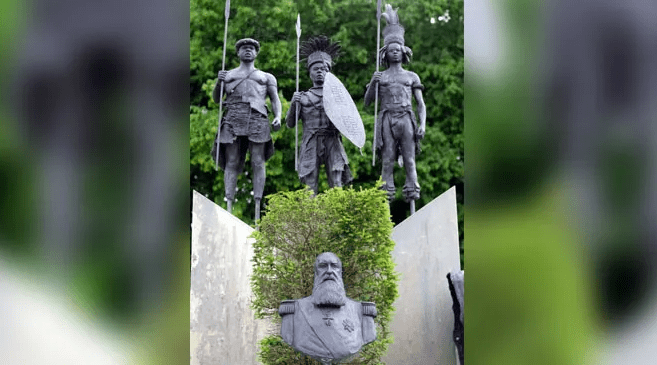A statue of Belgium's colonial king, Leopold II, in the Africa Museum in Brussels, has been daubed in red paint in the third act of defacement so far this year.
The Leopold bust in the Africa Museum in Tervueren, in the outskirts of Brussels, was smeared in red aerosol paint at the weekend.
The message "BLM II" was also spraypainted at the base of the bust, in reference to the US-originated Black Lives Matter movement that saw anti-racism protests branch out throughout the world.
Related News
- 50% think Belgian colonists did more good than harm in Congo
- 'First step': praise for King's letter to Congolese president
- Ixelles will remove bust of Leopold II's 'ruthless' colonial general
"It's already the third time this year that the museum's statue of Leopold II is defaced," director Guido Gryseels told ROBtv, adding that, while he did not approve of the defacement of statues, the incident would "certainly not be the last one."
"This action is part of a general protest movement against Leopold II and the violent regime he led in the Congo Free State," he said. "With what we know today about Leopold II's regime in the Congo, I also understand these actions."
Anarchists symbols and messages reading "millions died" were also visible on a strip of concrete encircling the statue, which features the bust of Leopold in military clothing surrounded by three Congolese men.
The men are placed above Leopold's head and are bearing shields and spears and are also standing on stick-legs, a reference to the routine use of limb amputation as a form of punishment in Leopold's Congo, from which not even children were spared.
Gryseels said that the museum had no information on the perpetrators of this defacement act, the second since June, when the BLM protests galvanised anti-racism, anti-police violence and anti-colonialism movements in Belgium.
The scale of the protests, including one which drew some 10,000 people to the Belgian capital in the midst of the lockdown, revived the debate on Leopold's legacy in both Belgium and the Congo.
Dozens of statues of the brutal colonial king were repeatedly defaced in all corners of Belgium. Petitions launched for their removal garnering thousands of signatures, with several being taken down, including in Mons, Antwerp and Leuven.
The scale of the protests, which came just ahead of the 60th anniversary of Congolese independence from Belgium, saw the government give the go-ahead to a parliamentary commission tasked with studying Belgium's colonial occupation of the Congo.
"The Congo parliamentary committee, which will look at our colonial history and consider whether Belgium should apologise, will start in October,' Gryseels said. The issuing of an official apology from Belgium would open the door for Congo to demand reparations.
The launching of the parliamentary committee also came after Belgium's head of state, King Philippe, expressed his "deepest regrets" over Belgium's actions in the Congo.
While the king's letter stopped short of an apology, it marked a turning point for the Belgian monarchy, since it was the first time a member of the royal family acknowledge the wrongs committed by Leopold during the decades he exploited the Congolese for his personal gain.
Gabriela Galindo
The Brussels Times

